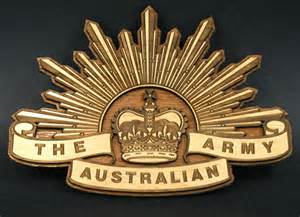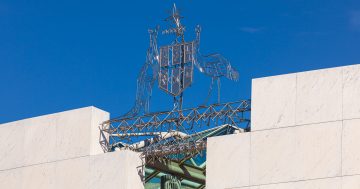
There was a good article in The Canberra Times from John Warhurst late last week on the use of defence uniforms as part of political campaigns. It’s worth a read.
I’m at a bit of a loss as to why the whole issue is such a big deal.
I agree with some of the commentators who have said that the depiction of people in uniforms of past employment is really just a pictorial statement of their life experience and employment. The images, however, are supposed to elicit a positive perspective of the individual as being someone active in the defence of our country.
Interesting though, that there are many in all of the parliaments in Australia who are ex-service people or members of the armed services reserves. Every now and then some pop up and use their service and an attribute to attract votes. Most don’t though.
Here in the ACT, we had Steve Pratt, a major in the Army, portrayed as a hero after being imprisoned for spying. The truth of the matter didn’t matter much but the imagery certainly helped him. The current Leader of the Opposition, Jeremy Hanson, was a Lt Colonel in the Army and holder of a DSC. He has used desert images of himself in election material in elections past. Again it is the imagery.
The Libs have a habit of promoting candidates with service history but only a few of them have used their service in a campaign picture. Almost all have referred to their service in written material and so they should. It tells us a bit of how they tick.
Bill Stefaniak was a major in the Army Reserve for decades and hardly anyone knew. Bill let his other credentials sell him as a pollie.
Graham Edwards, an MP from Western Australia, was not only a Vietnam vet but a disabled one at that. Tim Fischer was another and neither of these needed to put images of themselves in uniform in campaign material.
As an amusing aside, it seems only ex-officers fall into the trap of using images. I don’t know of any corporals or sergeants who have used pics of themselves, even though I’m sure there are many of them in politics. Indeed, Harold Hird, an old colleague in the Assembly, was a sergeant medic in the Army but no one knew. Or cared.
Warhurst made a good point in saying that the media hype and ADF response has just highlighted the candidates as being ex-serving soldiers better than their posters.
What these images, and accenting this experience in campaign materials does do, though, is to reveal a leaning towards this vocation in framing views to be applied in the political arena. It can show whether a candidate is a hawk or a dove in defence matters. Sometimes it can be misleading a bit though. I know Mike Kelly has extensive active service as a Colonel but I also know of his abhorrence of war. I don’t know Andrew Hastie but I do know that generally, Special Forces operatives don’t share that abhorrence. In Nasho, I did a 10-week stint at the SAS barracks in Perth as part of training in Army administrative matters, and met some of the SAS soldiers and I can say that they were a scary lot and quite at ease in a warlike environment.
It is clear that these experiences, like all experiences in life prior to political ascension, influence the pollies. But is this unique? Is there any conflict of interest?
Some bright spark suggested recently that lawyers should be barred from politics because they are creating the laws that they will make a living from. Long bow perhaps. But lawyers’ experience, accountants’ and economists’ experience all influence their political attitudes.
I was interested recently in this aspect of prior employment, and pondered to what extent the voters judge candidates on their prior experience and the potential for that experience to influence them in a parliament.
I was having a conversation recently with a policeman friend of mine around the separation of powers doctrine and our differing views on whether police forces were part of the Executive or part of the Judiciary. We both agreed that the notion that police were part of the judiciary would influence the position of a pollie who was an ex-policeman such as Peter Dutton and the like. Certainly Bill Stefaniak was influenced by his experience as a former police prosecutor.
And what about the Rev Fred Nile in NSW. He has brought his religious extremism into the NSW parliament. I know that there are many people in parliaments with religious views which influence their positions on social issues but at this point I am cogitating pollies, or potential pollies whose prior employment was within particular spheres.
Doug Nicholls in South Australia was a pastor who served in the South Australian parliament and went on to be knighted and become the Governor of that state. I am not aware that he used his experience as a clergyman to influence issues in South Australia. Labor has Gordon Ramsay running in Ginninderra and he is a minister of religion.
I guess, as long as men and women of the cloth understand the separation of church and state, all can be well.
So I don’t see the problem in people wearing uniforms in campaign material because it tells me a bit about how they tick. It is the candidates who have strong views on other social issues that I don’t see, which is more of a worry.













